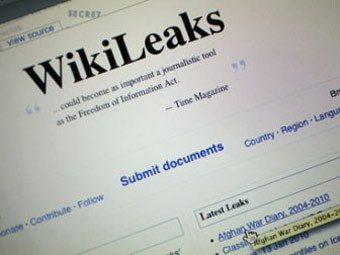WikiLeaks: another, unusually large portion of documents
 Last week an unusually large portion of the documents of the US Department of State appeared on the WikiLeaks website. Among the recently published dispatches are also documents of the US Embassy in Moscow. Foreign press comments on the next leak.
Last week an unusually large portion of the documents of the US Department of State appeared on the WikiLeaks website. Among the recently published dispatches are also documents of the US Embassy in Moscow. Foreign press comments on the next leak.“WikiLeaks leaves in despatch the names of the sources from which diplomats get information,” warns the New York Times in the headline. The US administration is alarmed by the fact that the leaders of WikiLeaks changed their tactics - they immediately posted almost 134 thousand dispatches of American diplomats to the network.
The published dispatches contain the names of some people who spoke with diplomats in confidence. “In dispatches, their names are provided with a recommendation to“ carefully protect, ”the newspaper writes. The State Department and human rights activists fear that these sources, including community activists, journalists and scientists from authoritarian countries, will be persecuted. Previously, WikiLeaks and the media, to which she provided access to the mails, published edited texts in order to protect the sources.
The publication is likely to stir up the debate about the pros and cons, which carries the publicity of the confidential opinions of American diplomats. Last year, WikiLeaks was sharply criticized for publishing the names of Afghans who provided information about the Taliban to the US military.
')
According to the newspaper, the State Department took into account in advance that all 250 thousand of stolen dispatches can be published. A team of specialists looks at all the dispatches and warns people who are mentioned in them. “Some particularly vulnerable people were helped to resettle, usually abroad,” the newspaper said.
It is possible that the dispatches to WikiLeaks were published by chance - suggests in the title of the Washington Post, referring to yesterday's article in Der Spiegel. According to the German weekly, the unedited text of dispatches of American diplomats, in which confidential assets, sources and informants are mentioned, have been walking on the Internet for several months. According to Spiegel, these documents were published by WikiLeaks by chance, says correspondent Haley Tsukayama.
Last year, Assange quarreled with his closest associate, Daniel Domsheit-Berg, and he took with him an encrypted unedited file containing more than 250 thousand diplomatic telegrams. “Shortly after Domsheit-Berg returned the files at the end of 2010, WikiLeaks supporters uploaded them to the Internet, not knowing that there was an encrypted dossier among them. Then a certain third party posted the password, unaware that it gives access to unedited files, ”the article says.
Meanwhile, the official account of WikiLeaks on Twitter states: “Underinsurance” WikiLeaks files are not decrypted. All media is currently disseminating incorrect information. There was no leak in WikiLeaks. ”
“Russia: Wikileaks about fitness and the middle class” - is an article by Courtney Weaver in a blog on the Financial Times website. Among the recently published dispatches are documents of the US Embassy in Moscow, from which it follows that for the last 10 years, American diplomats have been tracking all aspects of Russian life. “But their conclusions are more like Reader's Digest magazine than Le Carré's novels,” the journalist said ironically.
So, one dispatch is devoted to the boom of fitness clubs in Russia, others to the Russian middle class: income, political convictions, ideology. The State Department is interested in the middle class, because, according to some expert mentioned in the mails, in the years 2000-2007 this was from 12 to 20% of the population of Russia.
“The majority of middle-class Russians during the financial crisis managed to keep their jobs and therefore are not concerned about the problem of creating jobs (this is unlike the American middle class, for example). But a more serious problem is the decline in real wages, ”the author writes, retelling dispatches. The main question for American diplomats is whether the change in the material position of prosperous Russians will affect their political views? “In dispatches, people constantly complain that the Russian middle class is mostly apathetic, unlike similar social strata in Europe,” the author explains.
In general, these dispatches do not contain anything shocking and will have little effect on US-Russian relations, especially compared to the dispatches about “Robin” and “Batman”.
via wired.com / inopressa
Source: https://habr.com/ru/post/127369/
All Articles